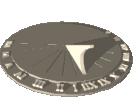|
Arriving in the New World: How Our Immigrant Ancestors Coped in their New Home
Using group exercises and discussion, this presentation introduces
attendees to the difficulties people have when trying to learn a new culture. Drawing on the research of noted scholars
in the field of Intercultural Communication, this workshop applies their theories to experiences attendees have had and relates
them to the experiences early immigrants probably had. Hopefully, the result will be an understanding of the acculturation
process. Participants need no prior genealogical experience.

Cut & Paste: Lexicons of Lost Lifestyles
What did words we use today mean to our ancestors? This participatory
workshop strives to answer this question by dividing the audience into smaller groups. Each group is given
a "quiz" sheet with a list of words and phrases and instructions to try to determine the origins or original meanings. The
groups then share their "findings" for discussion and/or correction, as applicable. For best success, this workshop
needs to be held in a room with moveable chairs so people can visit with one another.

Making the Dead Live Again: The Value of Family Folklore
Scholars claim that we are all storytellers. This participatory
workshop begins with some basic theory on this claim, then involves the attendees by asking for examples. Participants
share the stories from their family histories, showing how families are drawn together and/or torn apart by the stories that
are passed along from generation to generation. By understanding the stories of our ancestors, we can often understand
the behaviors, motivations, values, etc. of those who raised us and, sometimes, even ourselves. This workshop is most
appropriate for groups of under 40 members in attendance (it can be difficult with larger groups as it is hard for
all to hear; however, there are ways to adapt it, if necessary - just be certain to clarify group size in advance).

Mob
Action: Working as a Group to Tear Down Brick Walls

This
program focuses on using techniques for group interaction and task management that societies and families can use to work
together in order to solve genealogical problems. Small group methods of brainstorming and problem solving will be explored
and put to the test on actual family history research issues. Attendees should
gain some insight in how working with others can help them to solve the puzzles that plague society members. People will also receive suggestions on how societies and families can plan meetings that will apply the
lessons taught here. If there are more than a dozen participants attending, people
will be divided into small groups for the application portion: it is recommended that an estimated “head count”
be provided a few days before this workshop is presented.

Say
What? How did Your Ancestor Pronounce those Names?

|
| Available soon |
Do you know how your ancestor pronounced his/her name? How about the name of the
hometown? This is the topic of this workshop. Examples will be provided, giving hints of how we might determine
the pronounciations our ancestors used, and participants will be encouraged to share some examples from their own families
and/or research. It promises to be a workshop with both education and humor.

Tattle Tale! Ethical Dilemmas Faced by Genealogists

Whether
you are the family historian, a hobby genealogist, or a professional who researches for clients, there are times when the
question arises: “How much of the ‘truth’ do I tell the family?” This program looks at the fine line
that divides what should and should not be shared, with whom, and how. Based on over 20 years in the field of Speech Communication,
including the study of ethics in interpersonal relationships, I will present ethical dilemmas for discussion among the group
members.
|

